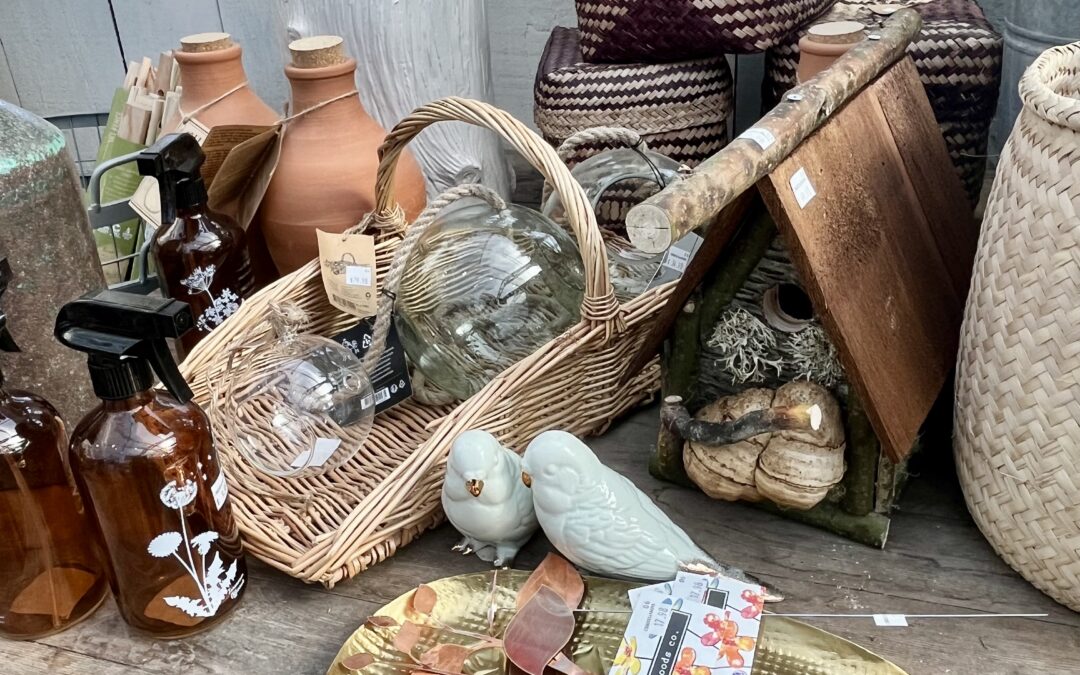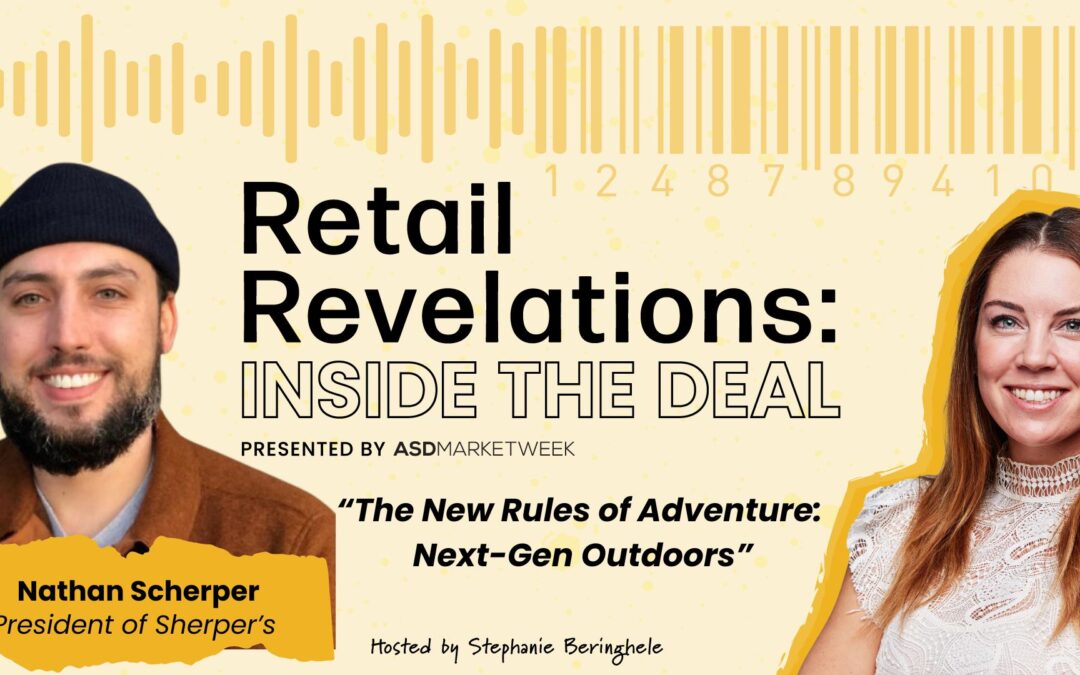Welcome to Let’s Talk a Little Shop, a podcast created by ASD Market Week. Let’s talk a little shop aims to help small businesses navigate the rapidly changing retail landscape, whether you own a brick and mortar store or an online seller, or both this podcast provides tangible strategies to keep your cash register ringing.
In this episode Macala Rose and Chris Guillot talk about how retail store owners:
- Can find joy in their businesses, especially if they’re burned out.
- Can reinvent their retail business by inventing themselves, and aligning their operations to their values and beliefs.
- The questions retailers need to ask themselves in order to successfully hire and keep great employees.
- Design teams that meet and exceed customer expectations.
- Successfully navigate DEI, inclusivity and master their hiring processes.
Listen to the full episode here:
Macala (00:24):
Hi everyone. This is Macala with ASD Market Week. And today I am here with Chris from The Merchant Method. Chris, I’m just gonna let you introduce, um, who you are and what you do to our retailers.
Chris (00:41):
Oh my gosh, Macala. Thank you so much for having me. Hi retailers, I am Chris Guillot. I am like you. I am a retailer down to my car. It’s in my DNA and I love to shop naturally. I was really happy to pursue a career in retail as a retail consultant, and I am also a small business lover. So these days I am a retail consultant and small business coach for indie minded, creative product based inventory based entrepreneurs.
Macala (01:09):
And this goes beyond just retail physical goods, right? You work with restaurants, cafe owners, like to give them a little bit of a wider understanding of what you work with in terms of retail.
Chris (01:22):
Oh, absolutely. Um, if you have a product or a service for which you hold inventory, for which you hold product and you use team talent, your merchandising skills, you make things, you sell things I help support you so that you can build profit in clear, achievable steps. That really is the focus is making it clear, making it achievable and making it motivating.
Macala (01:51):
So because of our previous conversations, I’m just gonna jump right into the meat of what you do. What you do and how you work with retailers. It is very different than most of them are used to. So Chris, let’s start with mindset, tell me how a business owner’s values and the way they think about their business and their personal lives really impact their success.
Chris (02:16):
For all of us that have this entrepreneurial spirit and are doing the things that we think are missing in the world. We wanna do it differently; we come to it from a place of being left out, being overlooked, being forgotten, or being burned about something, just being left behind. And we feel either wronged or we feel. That just needs to not be the case. That comes from a place of personal value and personal need.
And so when you have a business owner who comes with such passion as a true entrepreneur, a true merchant, a true brick and mortar business owner, with a mission the personal value and the business mission is very conflated. It is almost difficult to pull them apart and honestly you wouldn’t want to.
And so my perspective around supporting business owners, whether you’re a single owner operator or you have a team of 75 or 80 people, is to partner the sensibilities of why the business exists. You are very educated in intuition, your values with the strategies so that all the strategies tie all the way back to the very reason why you needed to start the business. We have to kind of take that conflated set of values and almost recalibrate it.
Macala (03:41):
How do you help retail business owners define their values and create that alignment?
Chris (03:47):
It is about for me in the way that I can do it is to listen and to provide clarity. It’s so difficult to explain as a grown adult, all the feelings that you have. And all the thoughts that you have running during the daytime hours and in the evening hours when we are supposed to be asleep. And so what I do is I do a lot of investigation, a lot of interviews. I snoop around in a business and I ask a lot of questions to really clarify and crystallize, “Oh, you mean this?”
And so while I don’t come to work from a retailer’s perspective, I come to the strategy from that very same place. “What are you trying to express? What do you really want?” What we’re doing is creating internal consistency from the things that we want and the things that we say to how we put it out there and sell it.
Macala (04:39):
Okay. And so based on that, how do you help retailers align that to their long-term growth and success?
Chris (04:48):
Um, I love this part. This is my favorite thing, which is asking and helping retailers, whether you’re a high-level leader or the business owner, to clarify the values of the brand often there’s company missions or for many business owners that have like running their own operation for a while, there are values that guide the product merchandising, or the menu assortment or the cooling of what customers buy, but the actual values, like depth, intimacy, sustainability, community, we’re talking about like core values.
And really asking them to prioritize them. And it seems almost impossible to say that security is more important than depth is more important than sustainability. But when we don’t lay down a solid foundation that is highly prioritized, we spend a lot of time moving blocks and we spend a lot more time debating things when things could be clearer.
So we prioritize the operating values, what will become brand behaviors. And we really look at where a company wants to grow to see if the strategies and of the ways we wanna grow, what moves the needle and what’s most relevant to the value. Like it seems very, um, internal seems like a lot of internal work, like soul work. It’s actually very numeric and I can get it down to an index number where I say this scores 150 and this gives you personal ROI and financial ROI. It’s just, it’s a process. This is why brand values and guiding principles need to be clarified and prioritized.
Macala (06:37):
And so a lot of that goes into, um, you know, defining teams and building culture. So, you know, your approach is very unique. I mean, you use co-learning, cognitive learning, and even neurodiversity in the development process, for a retailer support system. So kind of talk to me about that in relation to building a healthy team to support your retail endeavors.
Chris (07:04):
Yes. Okay. So there’s kind of two things there. One thing is about culture and climate and the other thing is about learning. So like let’s just talk about culture and climate first and then I definitely wanna dive into the learning piece. Okay. So oftentimes when I’m talking with owners, we talk, you know, what I hear and where we start the conversation is this is very important to our culture.
It’s in job descriptions, it’s in the conversations that happen at leadership and management meetings. But then when you actually look at the day-to-day operations and the employees who actually establish the relationships with customers. Either in a brick and mortar or through order fulfillment or through customer service or through social media, that is where your customer actually experiences the culture. And the customer defines what the brand and the culture is to them.
Now there’s a lot of ups and downs when it comes to teams, whether you have a team member who is out sick because they got COVID or a very important team member who’s out on parental to leave or something is happening economically, or something’s happening societally the climate changes, which makes the culture very difficult to achieve.
And so when it comes to managing teams, it’s really about creating operational structures and opportunities for performance and communication and clear expectations. So that as the climate shifts, the people in the process are less prone to shifting with it. So you can crucially have the culture that you want. So that’s like that’s HR operations and HR, people management that bit, the second piece is around learning and being a learning leader. Like I like to vote for everyone to be a learning leader.
I advocate for everyone to learn how they learn. And as a leader, I advocate for you to teach other people how to teach. Particularly on your team. Now what happens when we’re entrepreneurs and it’s like, happens to me like a lot is that we think that learning is a very linear process. We think it’s academic, we think there’s a rubric and the rubric results in like cashflow in like cash flow inventory turn. Profit.
That it happens more quickly. Well, when we are learning in an environment that is continuing, like will always be ambiguous will always shift where there is never accounting for any customer taste. We have to be dynamic learners. And often I’ve found for the like hundreds and hundreds of entrepreneurs I’ve worked with, we are not classic classroom learners.
Macala (09:45):
Yes.
Chris (09:46):
We’re neurodiverse in an overlooked population. So the learning and the teaching and the structure just has to be different because the typical things don’t work. Otherwise everyone would get an MBA, and MBA would work for everyone and a system would work for everyone and it doesn’t, it has to be personalized. And you have to know how the people on your team and the adults on your team learn how behavior is shaped in order for any of the strategies to actually be implemented in the way that you want.
Macala (10:21):
So what do retailers need to know about building and maintaining these new types of cohesive teams?
Chris (10:30):
Oh my gosh. Okay. Can we just dive into HR? Let’s do it.
Macala (10:34):
Let’s do it. Let’s go turn up some music in the background. Let’s go. Let’s talk about DEI, inclusivity, modern retail, HR practices. Talk for as long as you need, because this is like, again, this is a topic that so many people are trying to navigate post COVID and all these others in this time.
Chris (10:58):
It’s gratifying and it’s achievable to be profitable, to be personable, and to have your values come forward and change the world. Like these things are not mutually exclusive for so many, um, business owners. When we think about HR, we either think about hiring or firing. And very little in between finding the right person. Or I made the choice in the wrong person. I don’t know how to change that relationship. It needs to end and most people just don’t grow up professionally or don’t go to school to do HR related things. It’s almost as if you don’t wanna talk about it in the same way as some people don’t like to talk about money.
I love to talk about weird relationships and I love to talk about money. So when it comes to HR, I feel like the biggest opportunity we have as a small business community who employs a large part of the workforce, which means we impact the economy. If we want a better future, we need to start thinking about how we recruit, how we hire, how we train, how we develop and how we promote the people who we are fortunate to lead and manage. I know the community doesn’t all identify as mom and pop businesses, but most retailers have come to think about hiring is that “we should hire the person we would want to have coffee with, or want to have wine with, or that we vibe with, or like would totally fit with the culture.”
It sounds like our brand, dresses like our brand. But where we actually should be thinking critically upfront is around “What is the role we’re hiring for?” And get strategic from there. So we’re not solving on the back end, we’re solving on the front end. “What does the role need to make the business go in the way I needed to go? And how do I do that in a way that’s fully aligned with my brand values and my personal values?” So at night, the one of 200 employees I have, I can sleep. I’m not thinking too hard about the one or two, two roles that are challenging. And we’re hiring for the role and we are hiring asking real proper interview questions.
And we’re not listening for answers that delight us, but we’re listening for answers and aligning them to the kinds of answers we’re looking for. That shows capability, consistency, professionalism. This is what you can put in a rubric. Are interview questions and interview answers. It allows you to strip away what a person looks like, and sounds like. You know, a lot of things that decrease the diversity equity inclusion and what we’re hiring like what types of talent we’re hiring. Right. And that piece, the job description, the interview questions should really live through the life of the role.
Or the career journey of an employee. It should translate to onboarding and training, it should translate to annual reviews, it should translate to the next ladder up job description. Then eventually if you’ve done your job and there’s, you know, they’re ready to move on, they have left a better person because they worked for you. So these are, these are, um, these types of things really require us to do the hard work. Of articulating why the role is important, how the role contributes. It is not a checklist. It’s full capabilities of roles and responsibilities. Um, within an organization they just like to live with you. So it’s work.
Macala (15:05):
Yeah. You know, why don’t you dig a little bit more into it, you’re not hiring your best friend or the person you’d hang out with. Like, I think that, you know, in retail, many people feel like, oh, I want to like my employees, I want to have some sort of, you know, professional, but personal tie-ins to them. How can that be detrimental to a business?
Chris (15:29):
I feel like when we’ve, um, are making hiring decisions based on personality, we put too much trust in the unspoken, the unclear and the unsaid. And we put a lot of faith in, well, if I tell them to do something, we’ve got each other’s vibe and frequency, they’ll probably do it. we don’t put a lot of forethought into the operations of the business and how that role interacts with all the other interdependencies in a company. And we know that particularly when we’re talking about retail in the like $500,000 to $3 million, we’re not siloed roles.
There’s not one person whose full-time job is X. Or a group of people who’s full-time job is Y. There’s a lot of collaboration. And so when we don’t put a lot of forth sight, when we’re not asking clear questions, when we’re not clear about the kind of answer that would make a good candidate, then, we’ve done a disservice to the employee. Potential employee. We’ve done a disservice to the team, a disservice to the customer because customers are really, really smart. They know when there’s dysfunction happening on a team, they know when a customer serves, whoever’s receiving an email is dodging the email and not answering. We’re very smart as customers. So we need to make sure that the puzzle pieces fit and fit well.
Macala (17:00):
And, you know a topic within, you know, teams and staffing is diversity and inclusion. What can you share with retailers in that regard?
Chris (17:12):
In addition to thinking about the recruiting and hiring process from a day-to-day perspective, starting with the teams that we have now, and the people we work with now, whether they’re like on your payroll or they are like business partners, vendor partners, freelancers, really thinking through this onboarding process and the communication process. So oftentimes we think, “I want this thing to happen.I will say this thing will happen. And now I expect the thing to happen, and I don’t understand why this thing is not happening.”
We really need to spend, I would really encourage, leaders and business partners, stakeholders to spend some time researching and trying to understand cognitive behavior, behavior change, and a concept called scaffolding. In corporate speak, we would say setting someone up for success, we would ask things like, “How consistent are they? How capable are they and how consistently do they display that?”
Oftentimes, we want to get to consistency. We want to meet and exceed our expectations quickly, when we haven’t maybe even actually done the thing we need to do. Have we been properly informed? Have we properly trained? And have we properly checked for understanding? And so I would say when it comes to having an inclusive relationship, and being an inclusive employer, the best thing that we can do for ourselves is to slow down.
Macala (19:00):
Yeah. Yeah. Of course.
Chris (19:03):
Slow down in process, slow down in expectations, slow down in delivery. For most people even thinking about 90 days, 180 days. When you have only five people on a team it seems preposterous because we needed high performers nine months ago. Or if we’re implementing a full turnaround plan, because the business is underperforming, we feel compelled to make that happen so fast. But in the same way that yo yo dieting is a bad idea. Yo yo strategies break trust with your team and it breaks trust with your customer. Like slow is smooth and smooth is fast and it’s okay to slow down of course, to make sure that we get it as good as we can get it for the team that we’re employing.
Macala (19:54):
Yes. Awesome. So let’s kind of wrap this into, you know, you’re talking about systems, strategy, foundation, building for the future. So if someone does this and likes whether they’re working with you, or this is something that they’ve kind of been navigating on their own, um, cuz they’re pretty woke, how do you establish the values, creating that culture, and having a soul and very level expectations. How does that translate into growth and profit for their business?
Chris (20:27):
I love this question. Okay. So I think oftentimes, the best leaders that I’ve worked with that are very creative and visionary, they have a strong sense of where they wanna be in five, 10 years or where or where they wanna be from a revenue perspective. What is often missing in between the goals and the job description is a clear understanding of who does what, when. So typically y’all, I would just research RACI charts. Now they’re not a good fit for a lot of the type of businesses I work with, but the concept can be adjusted for your business.
And it gives you the opportunity to identify the most important milestones or disciplines that make the business go, and clearly identify and articulate who really advocates for this function who, um, really oversees it. Who do we go to for growth in this area, who supports them, and who provides the final yes or no? Because the final yes or no, the final sponsorship, does not always have to be the owner. Forcing ourselves to really detail the operations of the business almost starts with a lot of things like, “Oh, a lot of things are undefined!” It is awesome to hone in on what feels murky and try and clear it up little by little. I feel like that piece provides the end-to-end transparency that a lot of brands would benefit from.
Macala (22:08):
What are three tips that you would give to retailers as they move their businesses into their next phase of evolution post COVID.
Chris (22:18):
I love this. The first one that I would say is to be a learning leader. Either learn how you learn or pick up a book that talks about leading in 2022. So be a learning leader. The second thing is ask yourself to get clearer and clearer about the things that are important that you need or that you want. So the clearer we can get to expressing ourselves the better. The third piece is we all need help. We all need thought partners. Like we all need thought partners to find someone. It could be anyone that you trust for whom you could be a thought partner with to help you advance your thinking about your approach to business. It could be a mastermind, it could be your neighbor, someone in your BIA, one of your groups; identify this partner that will help you force this strategy that you’re developing in your mind.
Macala (23:29):
Awesome. Thank you so much, Chris.
Thanks for listening to learn more. You can find out more about Chris via her website, sign up for her free training, or follow her on Instagram.
To attend the next ASD in person, and learn from experts like Chris, register today. To keep learning and listening to more great episodes of our podcast, be sure to subscribe to this podcast on iTunes, Google play, Amazon or Spotify, and make sure to rate us too.








0 Comments